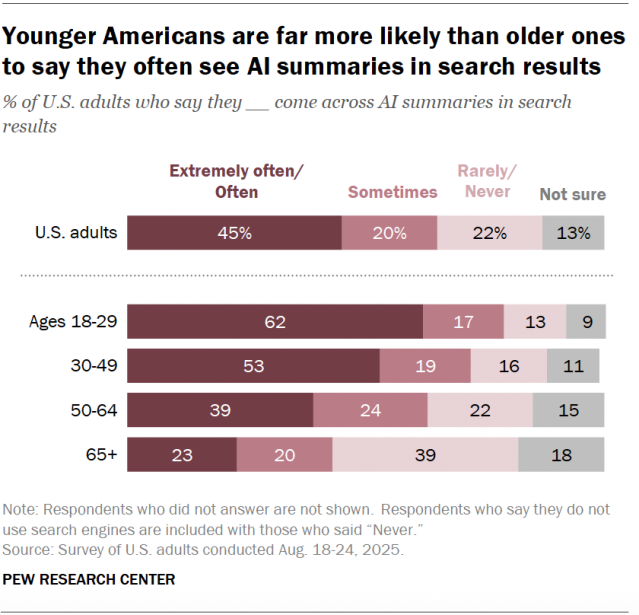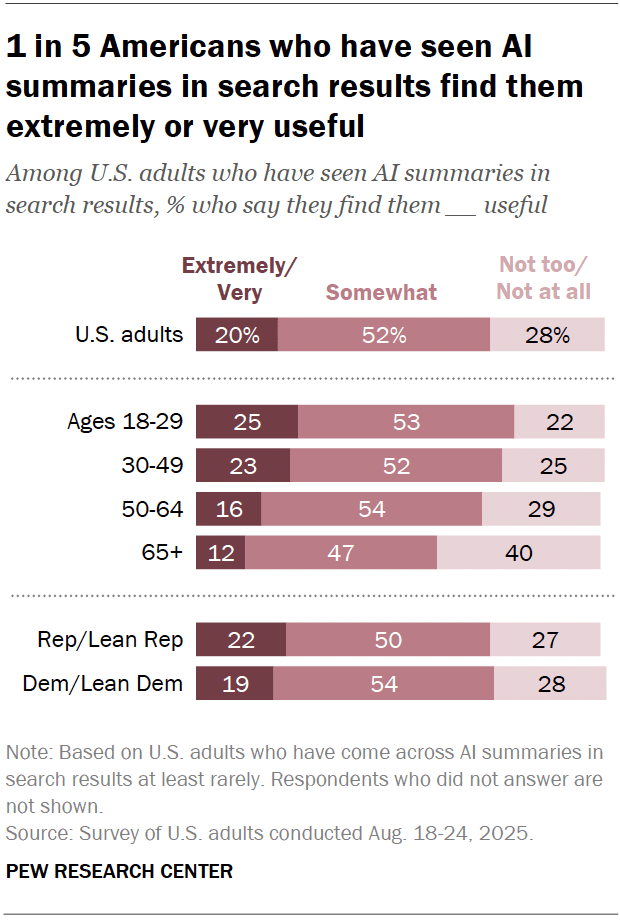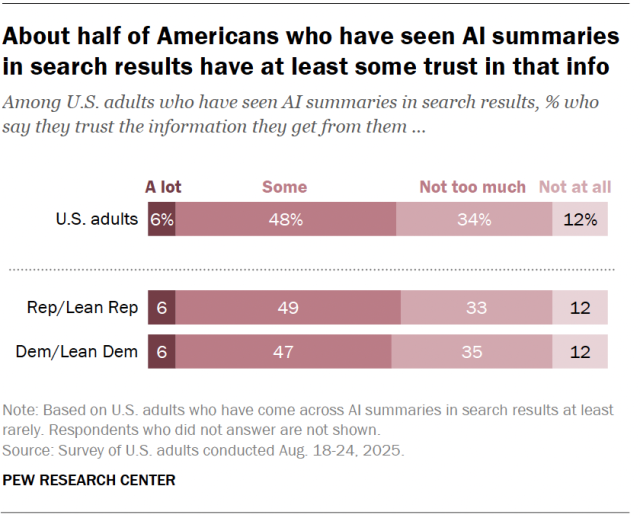Many search engines like Google or Bing now use artificial intelligence (AI) to provide users with short answers or overviews at the top of the page that are separate from traditional search results.

A majority of U.S. adults (65%) at least sometimes come across these AI summaries in search results. That includes 45% who see them extremely often or often, according to a recent Pew Research Center survey. A smaller share (17%) say they rarely or never come across these summaries.
An additional 13% say they aren’t sure how often they see these summaries, which are a relatively new feature from search engines.
How we did thisPew Research Center conducted this analysis as part of our ongoing exploration of the impact of artificial intelligence on society, including on the news and information environment.
To understand the views of the American public, we surveyed 5,153 U.S. adults from Aug. 18 to 24, 2025. Everyone who took part in this survey is a member of the Center’s American Trends Panel (ATP), a group of people recruited through national, random sampling of residential addresses who have agreed to take surveys regularly. This kind of recruitment gives nearly all U.S. adults a chance of selection. Interviews were conducted either online or by telephone with a live interviewer. The survey is weighted to be representative of the U.S. adult population by gender, race, ethnicity, partisan affiliation, education and other factors. Read more about the ATP’s methodology.
Here are the questions used for this analysis, the topline and the methodology.
Some groups are more likely to say they come across AI summaries in search results extremely often or often:
- Younger Americans: A majority of adults under 30 (62%) say they come across these at least often, compared with 23% of those 65 and older – a difference of 39 percentage points. (Younger adults also are much more likely to say they have heard or read a lot about AI and that they interact with it on a daily basis.)
- More educated adults: More than half of college graduates (57%) say they at least often come across AI summaries in search results, compared with 38% of adults with lower levels of formal education.
- Liberal Democrats: Overall, Democrats and independents who lean Democratic (49%) are slightly more likely than Republicans and GOP leaners (42%) to say they see AI summaries often or more. These differences are driven by the higher share of liberal Democrats who see AI summaries extremely often or often (56%). Smaller shares of moderate or conservative Democrats (43%), moderate or liberal Republicans (41%), and conservative Republicans (43%) say the same.
Related: The platforms where Americans get news, including search engines

Americans who have seen AI summaries in search results are lukewarm about their value. One-in-five say they find the information extremely or very useful, 52% say it’s somewhat useful, and 28% say it’s not too or not at all useful.
Younger adults are more likely to find the information from these summaries extremely or very useful. A quarter of U.S. adults under 30 say this, compared with 12% of those ages 65 and older.
About half of Americans who have come across AI summaries (53%) have at least some trust in the information from those summaries. But only 6% say they trust it a lot.
Meanwhile, 46% say they do not have much trust or any trust at all in that information.

Upper-income Americans (63%) are more likely than middle-income (53%) and lower-income Americans (50%) to have at least some trust in information from AI summaries.
However, there are no differences between Republicans and Democrats in how useful they think these summaries are or how much they trust them. For example, 54% of Republicans and 53% of Democrats say they have at least some trust in information from AI summaries.
Related: Republicans have become more likely since 2024 to trust information from news outlets, social media
Note: Here are the questions used for this analysis, the topline and the methodology.
Kirsten Eddy is a senior researcher focusing on news and information at Pew Research Center.
.png)



